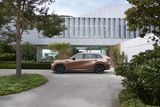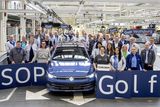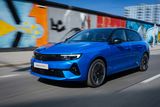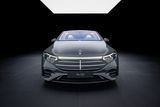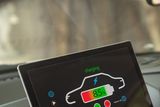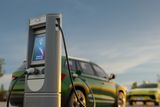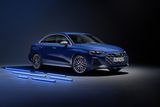Henry's great grandson samples past, present and future as another motoring revolution beckons us
I got the sense that everywhere Henry Ford's great grandson went in Cork last week it was like being in a time capsule that often touched the past, present and future at the same time.
For William Clay Ford Jr, it was an emotional visit to celebrate the 100th anniversary of the first factory outside the US being established in Cork.
It was also, I'm sure, a thoroughly enjoyable engagement for the executive chairman of the Ford Motor Company to chat, laugh and celebrate the moment with current staff and former workers.
And we were there to see and hear him most definitely touch on a future of monumental change.
Henry Ford
He spoke of past achievements, current goals and huge challenges in a world of rapid developments not just for his company and those who buy its products, but for all of us who need to get from A to B as part of our everyday lives.
We may not own our means of transport in a few years and we may not even have to drive cars if, as expected, we turn to autonomous driving technology to remove the drudgery.
The truth is no one is really sure where it's all going, but William Ford is certain of one thing: an unprecedented wave of change is bearing down on us. The future is change. And we need to better gird ourselves for it. All of us.
Announcing a special scholarship with UCC (five-year Ford Centenary Quercus) was more than a symbolic gesture to mark the 100th anniversary of the Cork plant.
It was an investment in fresh, innovative thinking. One that could blossom and be further enhanced by Ford as cars become computers on wheels. It's a move that says the future is brain power, not horsepower. We've got to think in a new way. One in which we can't go on making more cars that clog our cities and invite congestion charges. Rather we need to adapt the use of transport so cars are not lying idle for 20/22 hours a day; are not spewing harmful emissions; not blocking city streets. In short, we need to let go of ownership and sign up more for usership. Technology will make it so we can summon a car, not ours, to drop us where we want to go and then head off to do the same for someone else.
It's the future, and not just according to Mr Ford, but to many more like him.
For the 16 minutes I interviewed 'Bill' face-to-face I had that sense of us all being at a crossroads where the past, present and future intersected. It was a strange feeling.
Yes, we face a motoring revolution. But so did Henry back in the 'Wild West' days. And boy would his great-grandfather love to be involved in the whirlwind of this one.
Even the fact that electric cars will be at the centre of the future has links with Henry. "He worked for Edison, the electrical company, before he started Ford Motor company. Vehicles being produced then were mostly electric; a few steam," said William.
"He would love the innovation and the disruption taking place today. I think he would find this the most interesting time since he was at the birth of the industry."
But this overhaul of transport is about more than metal and steel. Self-driving cars, for example, carry a bootload of ethical and legal headaches too. "Autonomous vehicles will have such computing power they will be able to decide: which pedestrian do I hit? These are ethical questions that involve a lot of discussion. Hardware and software are coming quickly; ethics questions much slower," said William.
"We live in a fluid world. Not just the big tech giants (Google, Apple), but a lot of start-up companies are coming into our industry and a lot of suppliers are playing in pieces of our industry that they haven't in the past.
"So what does that mean for us? We have been talking to number of big-tech companies over the last three, four years.
"They were shocked at how much intellectual property we have and how much capability we have.
"We know how to make things and we know how to integrate software into what we make. Those are things that are underestimated by people on the outside looking in."
There will be more cooperation and partnerships than we have seen - on ethics, standards etc. And there has to be cooperation between manufacturers and governments because everything is changing. Everything.
William added: "Think about insurance. Who are you insuring if it's an autonomous vehicle that isn't owned by the individual? There are so many things: who is going to own these vehicles? Individuals probably won't. They'll be on someone's balance sheets. Will it be on a company like Ford's balance sheet? Will it be a big insurance company? Will it be the banks that own them?
"All these things have to be sorted and it is very early days. There are a lot of big questions to be sorted out. And they will get sorted out because as society becomes more familiar with this technology and wants it to happen, people will be motivated to solve these issues."
But right now, before the electrical/self-drive era dawns in earnest: what about diesel?
"There is a degree of shift. There is no doubt that is going on and is one of the reasons we are betting so heavily on electrification. I think Audi is, in many ways, instructive of their reaction to the diesel issue and on electrification. I think there is such momentum behind electrification that it is inexorable at this point."
But how long will diesel be with us?
"I don't know how long. I think it is unknowable because there are so many variables - the price of gasoline, diesel, taxation policies, government support, or lack of, for electrification. There are so many variables that will drive the customer pull for all of these technologies. So it is important that we invest in, and are represented in, all these technologies so we can react to shifts in customer demand.
"The world is changing fast. The clock speed is moving much quicker than the one you and I grew up with.
"We need to be nimble enough to react to changes. I think companies that don't react to changes are going to be left behind.
"I hope Ford is nimble enough. But we have to prove that over time. It is one of the things we plan for and spend a lot of the time talking about, but I believe we can be. But the proof will be in 10 years."
What market share will electric cars have in 10 years?
"I wouldn't even venture a guess because of all the variables I just mentioned.
"We are investing in electrification and in that investment it is our hope and belief that the customer will be there wanting it. Because it is the right thing to do for society."
I allude to Ireland's low take-up of electric cars.
"That could change. If the price of fossil fuels go up you could see a real tipping point."
Finally, a personal question to the man who followed in his great-grandfather's footsteps by being awarded an Honorary Doctorate of Economic Science from UCC and the National University of Ireland (NUI) last Friday.
How heavy a burden is it, making decisions that will affect people in so many ways?
"Nothing is more important to me than those who work in Ford. What happens to them weighs heavily, but is counterbalanced by incredible opportunities that I see ahead," said William.
"Everybody in life has their burdens and their challenges.
"Everybody has pressures and it's how you deal with them.
"I do know that being the great-grandson of Henry Ford and in charge of the company, I could let this absolutely crush me, saying I could never live up to that.
"But instead I choose to let it inspire me and to take the spirit of what Henry Ford did and like other family members who were head of the company, re-interpret that for the time in which we live."
Join the Irish Independent WhatsApp channel
Stay up to date with all the latest news
